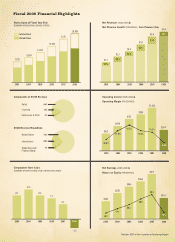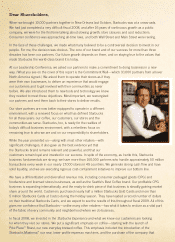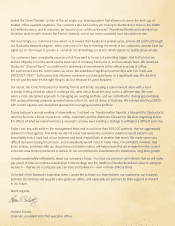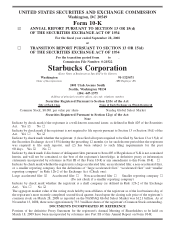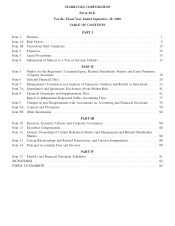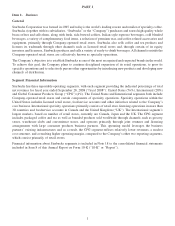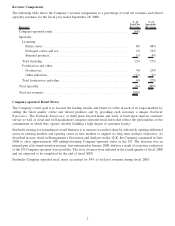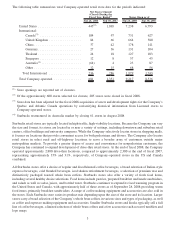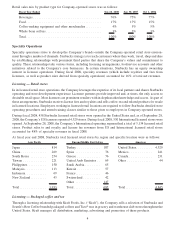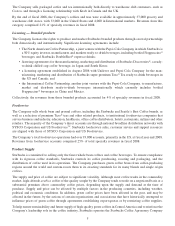Starbucks 2008 Annual Report Download - page 11
Download and view the complete annual report
Please find page 11 of the 2008 Starbucks annual report below. You can navigate through the pages in the report by either clicking on the pages listed below, or by using the keyword search tool below to find specific information within the annual report.The Company sells packaged coffee and tea internationally both directly to warehouse club customers, such as
Costco, and through a licensing relationship with Kraft in Canada and the UK.
By the end of fiscal 2008, the Company’s coffees and teas were available in approximately 37,000 grocery and
warehouse club stores, with 33,000 in the United States and 4,000 in International markets. Revenues from this
category comprised 21% of specialty revenues in fiscal 2008.
Licensing — Branded products
The Company licenses the rights to produce and market Starbucks branded products through several partnerships
both domestically and internationally. Significant licensing agreements include:
• The North American Coffee Partnership, a joint venture with the Pepsi-Cola Company in which Starbucks is
a 50% equity investor, manufactures and markets ready-to-drink beverages, including bottled Frappuccino»
beverages and Starbucks DoubleShot»espresso drinks;
• licensing agreements for the manufacturing, marketing and distribution of Starbucks Discoveries», a ready-
to-drink chilled cup coffee beverage, in Japan and South Korea;
• a licensing agreement established in August 2008 with Unilever and Pepsi-Cola Company for the man-
ufacturing, marketing and distribution of Starbucks super-premium Tazo»Tea ready-to-drink beverages in
the US and Canada; and
• the International Coffee Partnership, another joint venture with the Pepsi-Cola Company, to manufacture,
market and distribute ready-to-drink beverages internationally which currently includes bottled
Frappuccino»beverages in China and Mexico.
Collectively, the revenues from these branded products accounted for 4% of specialty revenues in fiscal 2008.
Foodservice
The Company sells whole bean and ground coffees, including the Starbucks and Seattle’s Best Coffee brands, as
well as a selection of premium Tazo»teas and other related products, to institutional foodservice companies that
service business and industry, education, healthcare, office coffee distributors, hotels, restaurants, airlines and other
retailers. The majority of the Company’s direct accounts are through national broadline distribution networks with
SYSCO Corporation and US Foodservice
TM
. Starbucks foodservice sales, customer service and support resources
are aligned with those of SYSCO Corporation and US Foodservice.
The Company’s total foodservice operations had over 19,000 accounts, primarily in the US, at fiscal year end 2008.
Revenues from foodservice accounts comprised 25% of total specialty revenues in fiscal 2008.
Product Supply
Starbucks is committed to selling only the finest whole bean coffees and coffee beverages. To ensure compliance
with its rigorous coffee standards, Starbucks controls its coffee purchasing, roasting and packaging, and the
distribution of coffee used in its operations. The Company purchases green coffee beans from coffee-producing
regions around the world and custom roasts them to its exacting standards for its many blends and single origin
coffees.
The supply and price of coffee are subject to significant volatility. Although most coffee trades in the commodity
market, high-altitude arabica coffee of the quality sought by the Company tends to trade on a negotiated basis at a
substantial premium above commodity coffee prices, depending upon the supply and demand at the time of
purchase. Supply and price can be affected by multiple factors in the producing countries, including weather,
political and economic conditions. In addition, green coffee prices have been affected in the past, and may be
affected in the future, by the actions of certain organizations and associations that have historically attempted to
influence prices of green coffee through agreements establishing export quotas or by restricting coffee supplies.
To help ensure sustainability and future supply of high-quality green coffees in Central America and to reinforce the
Company’s leadership role in the coffee industry, Starbucks operates the Starbucks Coffee Agronomy Company
5


